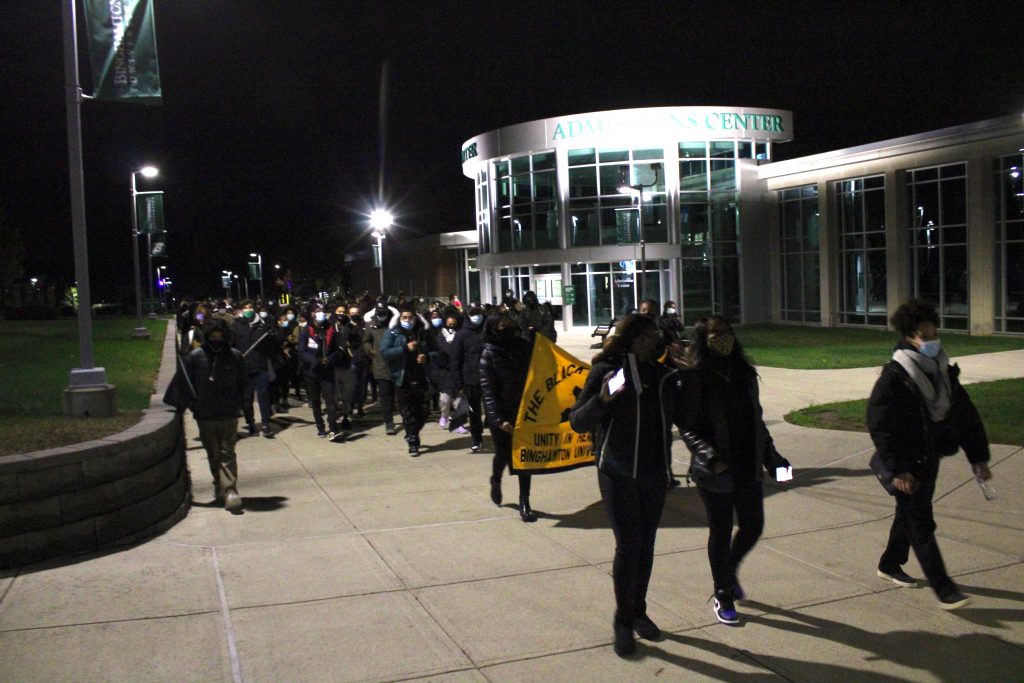On the eve of Election Day, over 50 students clad in black gathered in the University Union’s Tillman Lobby for the Black Student Union’s (BSU) Solidarity March.
The march was held in honor of Black Solidarity Day. Founded in 1969 by Carlos E. Russell, former Panamanian ambassador for the United Nations and Panamanian-born writer, activist and professor, Black Solidarity Day is meant to unite all people of modern African descent. Traditionally, for 24 hours, members of the African diaspora refrain from working, shopping, traveling or engaging in other commercial activities to demonstrate the power they hold in the economy. This is also meant to call attention to racism and social and civic injustice in America and abroad.
According to the BSU’s political correspondent Krista Hall, a junior majoring in philosophy, politics and law, the theme of this year’s Black Solidarity Day is centered around celebrating the Black immigrant experience and their contributions to America.
Leading up to the march, BSU hosted several meetings focused on a range of topics concerning the African diaspora, from the Haitian Revolution to the present-day fight against the Special Anti-Robbery Squad (SARS) in Nigeria. With these meetings, the BSU has been working to inform its members and connect them to the global African diaspora. Elizabeth Plantin, BSU’s educational coordinator and a sophomore majoring in English, emphasized the importance of this event as a time not only to unify Black people but to honor those who have lost their lives to police brutality.
“Since today is Black Solidarity Day, I felt like it was really important to group up together with all of these familiar faces, even unfamiliar faces, to show that solidarity in those Black lives that were lost to police brutality,” Plantin said. “I know police brutality is something that I truly feel strongly about because as apparent as it is in the world, a lot of police tend to kill Black men, Black women [and] Black trans lives, and they get away with this. So, today was a good reason to come out and show love to that.”
Black Solidarity Day is also important for Black students to feel connected to one another and find a sense of belonging. Calista Bryant, BSU’s Student Association (SA) representative and a sophomore majoring in chemistry, spoke about coming together for this reason.
“It’s important to show up for Black students on this campus because this is a predominantly white institution, and when I came here I really did feel alone,” Bryant said. “I really did not see people who looked like me, people who I felt like I could really connect with, and that’s why I feel like it’s really important to not only stand up for my people but to let people know that they are seen, that they have a place here and that they should feel safe here.”
Several students echoed the difficulty of being Black at Binghamton University, and how the University could better support its Black students. Patrick Saint Ange, a sophomore double-majoring in theatre and sociology, wants the University to better diversify its staff and better recognize the experiences of students of color.
“I hope that the University listens to its community of color, understands what it takes just to be here and moving forward and works to have better representation in multiple departments in the school,” Saint Ange said. “And again, first and foremost, just listening to what the students have to say.”
The march began with Saint Ange performing the Black national anthem, “Lift Every Voice and Sing.” Then, the gathering made its way out of the Union and marched toward Glenn G. Bartle Library.
BSU leaders paused the march at this point to read a short address about the life and death of George Floyd and Ahmaud Arbery, two Black men. George Floyd was murdered in May by white police officer Derek Chauvin. Ahmaud Arbery was murdered while jogging this past February by Travis McMichael and Gregory McMichael, two white men. The pair were not arrested until 74 days after Arbery’s killing, when a video of the McMichaels’ pursuit and murder of Arbery went viral. Their deaths ignited public outcry for police reform, demanding police value the lives of people of color.
Following a moment of silence, the march continued down the sidewalk, with chants of “Black Lives Matter” and “No justice, no peace, no racist police” echoing through the crowd. The assembly later paused to acknowledge the lost Black femme and Black trans lives of Breonna Taylor, Nina Pop, Riah Milton and Tony McDade. Further stops were made along the way to honor Elijah McClain, Walter Wallace Jr., Kevin Peterson Jr. and activists who have died protesting against SARS in Nigeria.
As a memorial for Black Solidarity Day, the BSU had lined the Spine with black flags bearing the names of those who died due to police brutality and systemic violence.
Looking forward, participants in the march said they will continue building community and offering support to Black peers, both on and off campus. Elias Banini, an undeclared freshman, spoke on the necessity of unity among everyone behind the issue of Black safety and justice.
“I feel like everybody has a really important role,” Banini said. “It’s not just really singular. I think if everybody stands up, it would be a lot better. One is not enough. I feel like if everybody works together, we could definitely create something better.”



